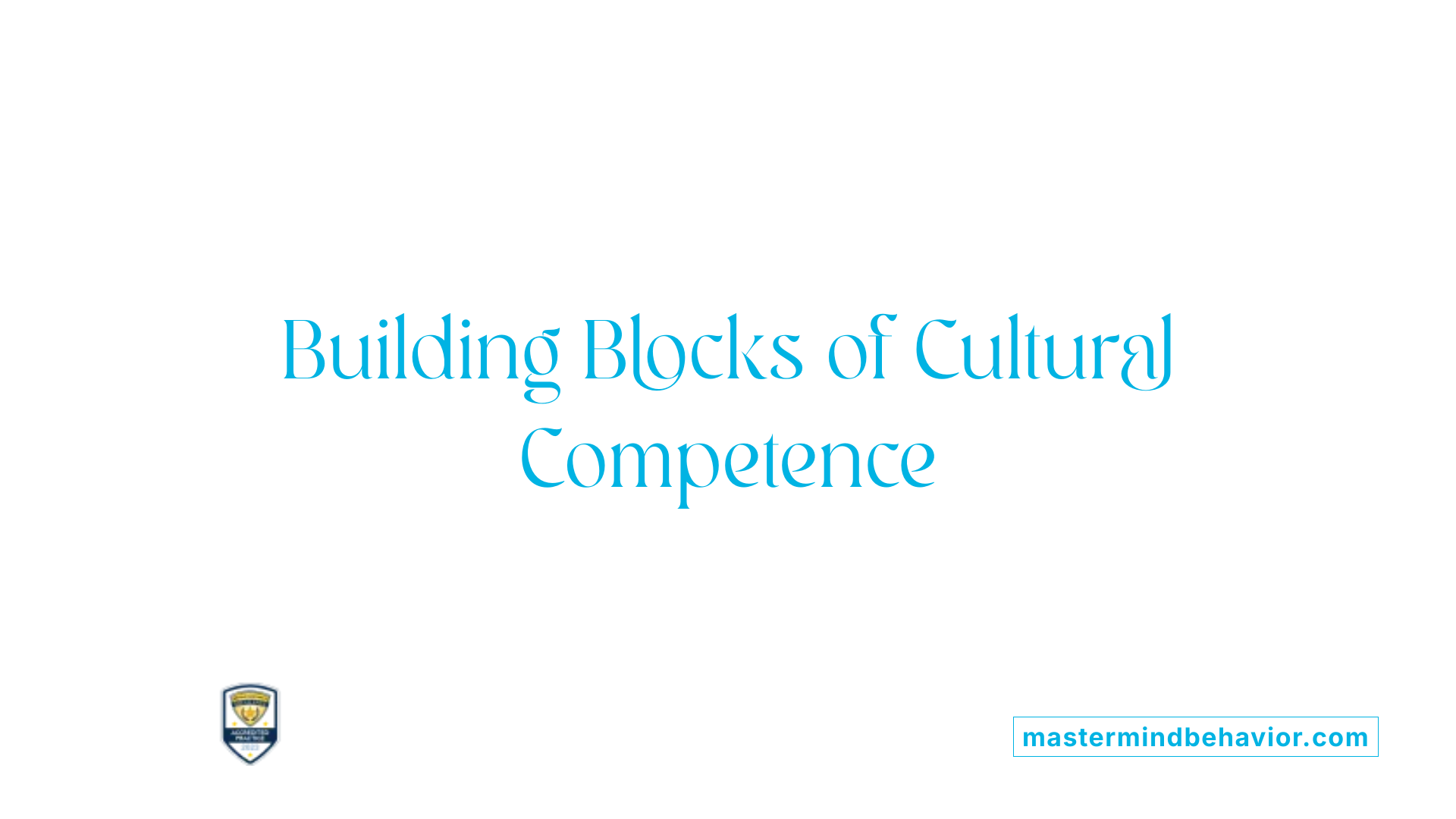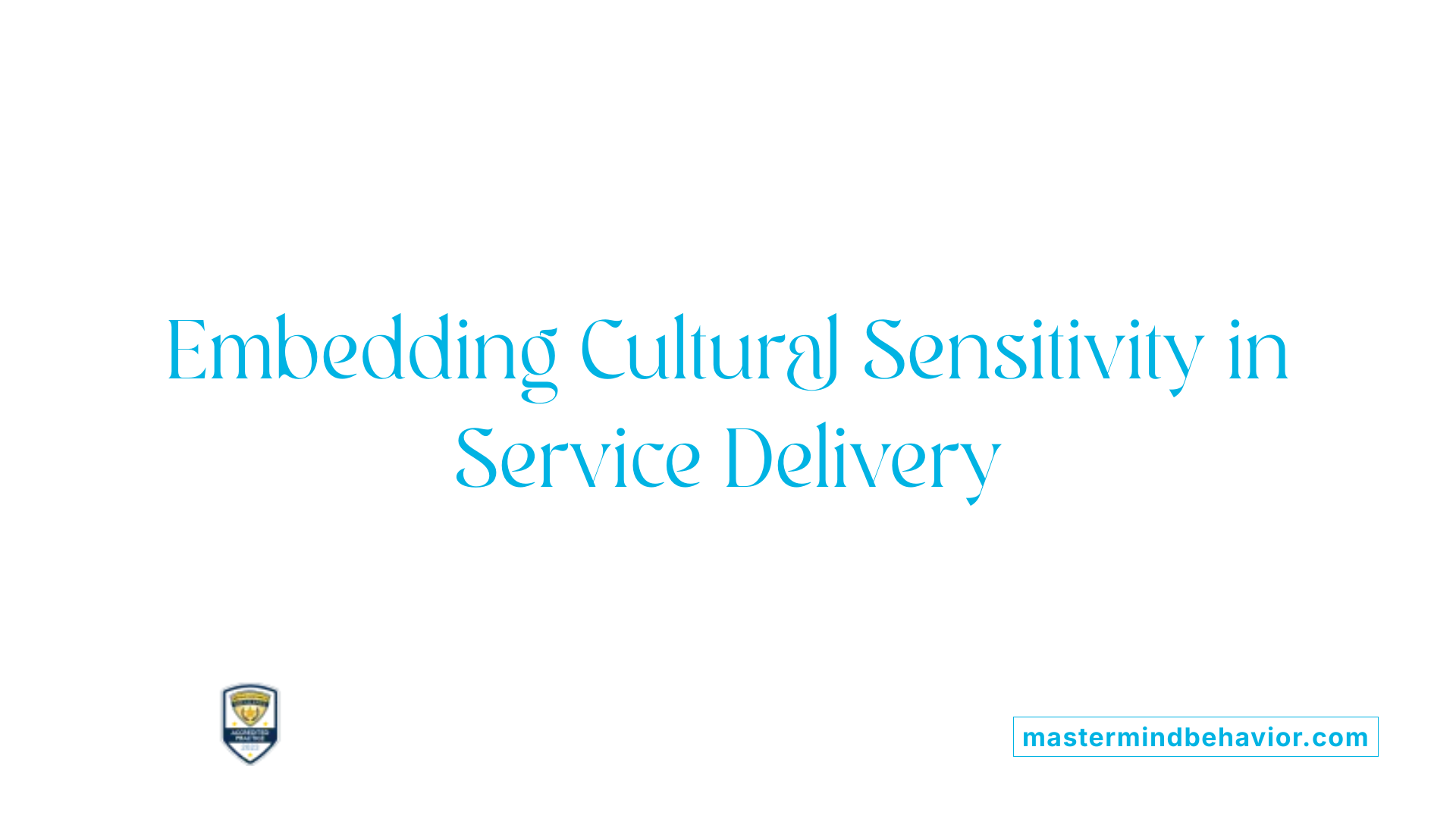Understanding the significance of cultural competence in behavior analysis
As the field of Applied Behavior Analysis (ABA) continues to expand its reach across diverse populations, the importance of cultural competence becomes increasingly apparent. Tailoring interventions that respect and incorporate clients' cultural backgrounds not only enhances engagement but also ensures ethical and effective service delivery. This article explores the critical role of cultural competence in ABA therapy, examining its components, application strategies, ethical considerations, and the profound impact of cultural humility on therapy outcomes.
Defining Cultural Competence in ABA Therapy
What is cultural competence in ABA, and why is it important?
Cultural competence in applied behavior analysis (ABA) involves a practitioner’s ability to understand, respect, and effectively respond to the diverse cultural backgrounds of their clients. This concept is crucial because it ensures that interventions are tailored to fit the cultural context of each individual, making therapy more meaningful and effective.
At its core, cultural competence encompasses awareness of one's own cultural influences and recognition of cultural differences among clients. Practitioners learn to appreciate how culture impacts behavior, perceptions, and responses to therapy. This understanding guides the development of personalized strategies that are culturally respectful.
Building cultural competence involves gaining knowledge about different cultural values and practices, improving communication skills, and engaging in self-reflection to identify personal biases. Such efforts help decrease misunderstandings and biases, fostering trust and stronger relationships with clients and their families.
Why does this matter? When therapists are culturally competent, they can adapt interventions to be more relevant, respectful, and effective. This approach enhances engagement, promotes the generalization and maintenance of skills, and upholds ethical standards.
Overall, cultural competence in ABA not only improves treatment outcomes but also ensures services are ethical, inclusive, and tailored to each client’s unique cultural identity. Continuous learning and self-awareness are vital to developing this competence and offering care that truly respects and responds to cultural diversity.
In summary, cultural competence in ABA is about understanding and valuing clients’ cultural backgrounds to deliver effective, respectful, and ethical interventions.
The Influence of Cultural Awareness on ABA Practice

How does cultural awareness influence practice?
Cultural awareness plays a foundational role in effective applied behavior analysis (ABA). When practitioners understand and respect the diverse backgrounds of their clients, they can tailor interventions that are both ethical and meaningful. This sensitivity allows for the development of strategies that align with clients' cultural values, beliefs, and practices, such as incorporating traditional foods or communal activities into therapy.
By recognizing linguistic preferences and social norms, behavior analysts can improve communication, making objectives clearer and more relatable. For example, using language and symbols familiar to the client or their family fosters understanding and collaborates on goal setting.
Moreover, cultural awareness helps in avoiding stereotypes and biases that could hinder progress. It encourages practices rooted in respect and inclusivity, which build trust and ensure greater engagement.
In a broader sense, being culturally aware promotes systemic equity by advocating for tailored services that consider cultural differences. This approach not only supports individual client success but also improves overall service quality and social validity.
Examples of culturally sensitive strategies
Here are practical ways that behavior analysts can demonstrate cultural sensitivity:
- Use of Culturally Relevant Materials: Incorporating traditional stories, music, or symbols that resonate with the client’s background.
- Family and Community Involvement: Engaging family members and community leaders in intervention planning and implementation.
- Flexible Intervention Goals: Adjusting objectives to respect cultural behaviors or practices, such as dietary restrictions or social roles.
- Language Adaptations: Communicating in the preferred language and considering literacy levels.
- Cultural Celebrations: Integrating cultural festivals or rituals into therapy to foster connection and motivation.
- Self-Assessment and Reflection: Continually examining one's biases and assumptions and seeking training on diverse cultural norms.
By adopting these strategies, ABA practitioners can foster an environment of respect and inclusion, ultimately leading to more effective and client-centered care.
Components and Principles of Cultural Competence in ABA

What are the key components of cultural competence in ABA?
Cultural competence in Applied Behavior Analysis (ABA) is a vital aspect of providing effective and ethical therapy. It involves several core elements that help practitioners better serve clients from diverse backgrounds.
First, ongoing self-assessment allows behavior analysts to identify and address their own biases and assumptions. Reflecting on personal cultural backgrounds and how these influence perceptions of behavior ensures more mindful interactions.
Second, understanding and respecting clients’ cultural values, beliefs, and practices is fundamental. This knowledge enables therapists to design assessments and interventions that are culturally relevant, increasing the likelihood of positive outcomes.
Third, adapting assessment tools and intervention strategies to fit the client’s cultural context is crucial. This may involve considering language preferences, traditional practices, and community norms.
Building strong relationships through active listening and open communication fosters trust and collaboration with clients and their families. These relationships are integral to tailoring interventions that resonate culturally.
Additionally, practitioners should pursue continual cultural education, engage with community resources, and seek cultural consultation when needed. These steps contribute to an inclusive and respectful practice environment.
Overall, developing cultural competence is a dynamic, ongoing process that enhances client engagement, promotes better intervention retention, and ensures ethical standards are met in diverse communities.
| Component | Description | Additional Notes |
|---|---|---|
| Self-assessment | Reflecting on personal biases and cultural background | Helps prevent misinterpretations |
| Understanding values, beliefs | Gaining insight into clients' cultural norms | Tailors interventions meaningfully |
| Adaptation of interventions | Modifying strategies to align with cultural contexts | Ensures relevance and respect |
| Relationship building | Establishing trust through active listening and collaboration | Fosters effective communication |
| Cultural education and resources | Continual learning and community engagement | Maintains up-to-date practice |
Implementing these components creates a foundation for culturally competent ABA practice, supporting ethical and effective service delivery.
Integrating Cultural Sensitivity into Service Delivery

How can ABA practitioners incorporate cultural sensitivity into service delivery?
ABA practitioners can significantly enhance the effectiveness of their services by embedding cultural sensitivity into their practice. This begins with actively engaging with the clients' families and communities to gain a deep understanding of their cultural backgrounds, including beliefs, values, and customs. Such engagement helps tailor assessments and interventions to align with the clients’ cultural norms, making therapy more relevant and respectful.
Ongoing training in cultural competence is vital. Practitioners should regularly self-reflect to identify and mitigate personal biases that could influence their work. Collaborating with cultural experts or community resources allows for better adaptation of strategies and fosters trust.
Language plays a crucial role in cultural sensitivity. Respecting clients' linguistic preferences and proficiency levels helps improve communication and understanding. Incorporating culturally meaningful materials and recognizing traditional practices can motivate clients and reinforce their cultural identity.
Creating a safe and inclusive environment involves celebrating cultural traditions and ensuring interventions are adaptable to cultural contexts. These practices improve engagement, lead to better behavioral outcomes, and uphold ethical standards.
In summary, culturally sensitive ABA practice integrates respect, understanding, and collaboration, ensuring that services are both effective and ethically sound.
Ethical Considerations and Best Practices
What are the ethical considerations in ensuring cultural competence in ABA?
Implementing cultural competence ethically in ABA involves respecting each client's unique cultural background, values, and norms. Practitioners are responsible for creating interventions that are not only effective but also respectful of cultural differences.
This requires ongoing self-reflection and training to recognize personal biases, stereotypes, and systemic barriers that could influence service delivery. Building cultural humility—a willingness to learn from clients and their communities—is vital for ethical practice.
Tailoring interventions to clients' linguistic preferences, traditional practices, and community expectations helps foster trust and engagement. Collaborating with families and local cultural experts ensures that services are culturally relevant and accessible.
Maintaining ethical standards also means balancing professional guidelines with the necessity of honoring clients’ cultural identities. This combination supports the generalization and sustainability of learned skills, ultimately leading to more effective and respectful treatment.
How can practitioners build trust and effective communication across diverse cultural backgrounds?
To build trust, ABA practitioners should prioritize active listening and demonstrate genuine respect for clients' cultural values. Clear, culturally sensitive communication helps clients and families feel understood and valued.
Utilizing culturally informed assessments and involving community resources or cultural experts further enhances understanding. Recognizing the importance of language preferences and incorporating cultural practices, such as traditional foods or communal activities, can deepen connections.
Creating an inclusive environment that celebrates diversity encourages openness and reduces resistance, fostering a strong therapeutic alliance.
What strategies promote ongoing learning and self-reflection?
Continuous education is essential for adapting ABA practices to cultural contexts. Strategies include participating in cultural competence training, engaging in mentorship from diverse colleagues, and seeking out multicultural experiences.
Self-reflection exercises, such as reviewing personal biases and biases in decision-making, help practitioners recognize areas for growth. Keeping a reflective journal or engaging in peer discussions about cultural challenges can promote awareness.
Learning from these reflections leads to improved service delivery and helps overcome unconscious bias, making therapy more equitable and effective.
How should ABA professionals balance professional standards with cultural needs?
Balancing these aspects involves integrating cultural knowledge into ethical, evidence-based interventions. Professionals must ensure that their practices do not compromise ethical principles like autonomy, beneficence, and justice, while respecting cultural values.
This can be achieved by customizing goals to align with clients’ cultural priorities, avoiding culturally insensitive practices, and advocating for equitable access to services.
Incorporating cultural humility into daily practice encourages ongoing dialogue and adaptation. Such an approach fosters person-centered care that respects individual and cultural differences while maintaining high standards of professional integrity.
The Impact of Cultural Humility on Therapy Outcomes
How does cultural humility impact ABA therapy outcomes?
Cultural humility plays a significant role in improving the results of ABA therapy by creating respectful and collaborative relationships between therapists and clients. When practitioners practice cultural humility, they approach clients' cultural backgrounds with openness and a willingness to learn, which fosters trust and engagement.
This mindset encourages ongoing self-reflection and self-evaluation among behavior analysts. By recognizing their own biases, misconceptions, and power dynamics, therapists can modify their methods to be more equitable and personalized. This process helps prevent cultural misunderstandings and ensures that interventions are aligned with the clients' values and beliefs.
Incorporating a client’s language, cultural practices, and norms into therapy strategies makes interventions more relevant and acceptable. Such tailored approaches are not only more effective but also promote a sense of respect and dignity for the clients.
Moreover, practicing cultural humility can help reduce disparities in access to ABA services, especially among marginalized populations. When barriers stemming from cultural misunderstandings are minimized, more individuals are likely to benefit from therapy.
Ultimately, embracing cultural humility fosters ethical, client-centered care. It ensures that therapy respects each individual's unique identity and promotes better engagement, making therapeutic outcomes more positive and sustainable.
Fostering Inclusive and Effective ABA Practices Through Cultural Competence
Integrating cultural competence into ABA therapy is essential for delivering ethically sound, effective, and inclusive services. It requires ongoing commitment to learning, self-awareness, and collaboration with clients and communities. By valuing diversity, respecting cultural differences, and practicing cultural humility, ABA practitioners can improve client engagement, enhance treatment outcomes, and uphold the highest ethical standards. As the field continues to evolve, promoting cultural competence remains a cornerstone in ensuring equitable access to quality services for all individuals, regardless of cultural background.
References
- Cultural Competency Training for ABA Practitioners: Best Practices ...
- Cultural Competence in ABA: Understanding and Respecting ...
- Cultural Considerations in ABA - Respect Behavior Therapy
- The Role of Culture and Diversity in ABA Treatment Plans
- Centering Cultural Sensitivity in Applied Behavior Analysis
- Cultural Humility in the Practice of Applied Behavior Analysis - PMC
- Cultural Humility in the Practice of Applied Behavior Analysis - PMC








